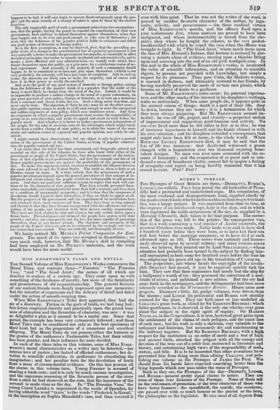MISS EDGEWORTH'S TALES AND NOVELS.
THE Second Volume of Miss EDGEWORTH'S Works commences the Moral Tales, and contains three—" Forester,! " The Prussian Vase," "and "The Good Aunt ;" the names of all which are familiar to readers of a certain age. They come upon us with something of the freshness of novelty, but more of the familiarity and pleasantness of old acquaintanceship. The general features of our ancient friends were deeply impressed upon our memories; but the minutim of expression and the delicacy of detail had faded under the action of smooth-wearing time. When Miss EDGEWORTH'S Tales first appeared, they had the air of a discovery. Fiction in the garb of truth, we had long had ; but fiction employed directly and practically upon the grand busi- ness of education and the formation of character, was new : it was as delightful a plan as it seemed to be a useful one. Since that period, the example has been very extensively followed ; and these Moral Tales may be considered not only as the best specimens of their kind, but as the progenitors of a numerous and excellent offspring. The Moral Tales do not possess either the humour or the genius of the authoress's Fashionable Tales, but their utility has been greater, and their influence far more decided. In each of the three tales in this volume, some of Miss EDGE- woRTH's moral characteristics as a writer may be detected,—her intense love of justice ; her hatred of affected enthusiasm ; her de- votion to scientific cultivation, in preference to stimulating the imagination ; and her peculiar turn for the devolution of truth from a mass of circumstantial evidence. On this last process all the stories in this volume turn. Young Forester is accused of stealing a bank-note; and it is only by much curious investigation, and the ingenious reasoning of the favourite person of the story from a stain he had observed on the note, that the innocence of the accused is made clear as the day. In "The Prussian Vase," the young Count Laniska is imprisoned in the castle of Spandau, for having added the word " tyran" to the words " Frederick le Grand," ill the inscription on Sophia Mansfield's vase, and then covered it over with blue paint. That he was not the writer of the word, is proved by another favourite character of the author, by inge- nuity, activity, and perseverance — the three cardinal virtues of Miss EDGEWORTH'S morals, and the offence fixed upon. a poor unfortunate Jew, whose motives are proved to have bett malignant, and whose instrumentality is traced from the che- mist's shop where he bought the colours, to the very pocket- handkerchief with which he wiped the vase when the offence was brought to light. In "The Good Aunt," where much turns upon the loss of Mrs. Howard's fortune, that fortune is restored by pur- suing a minute chain of evidence, turning upon a thimble fitting upon and screwing into the end of an old gold toothpick-case. In this and in the whole of Miss EDGEWORTH'S works, is inculcated the value of scientific information, and an attention to scientific objects, by persons not provided with knowledge, but simply a respect for its processes. Thus poor Cuba, the Mulatto woman, is rescued in distress, and ultimately restored to her friends, by having carefully preserved the seeds of certain rare plants, which became an object of desire to a gardener. Some of Mr. EDGEWORTH'S notes occur: his paternal imprima- turs, and the other marks of' his interest in his daughter's writings, make us melancholy. When some people die, it appears quite in the natural course of things: death is a part of their life, they lie down, because they are weary ; it is a termination for which they were always preparing. But Mr. EDGEWORTH seemed im- mortal : he was all life, project, and vivacity—a perpetual motion of improvement and suggestion, good-humour and activity. No one ever lived more than he did either in fact or in idea:' he was • of immense importance to himself, and his family chimed in with his own valuation ; and his daughter extended a consequence that might only have been felt at home, to the whole world. When RICHARD LOVELL EDGEWORTH died, it may be said that the less of life was immense : that death-bed witnessed a groan charged with a lamentation over ten thousand expiring bene- volent designs. No man was ever more saturated with the es- sence of humanity; and the evaporation of so great and so con- densed a mass of beneficent vitality, cannot fail to inspire a feeling of sympathy and regret on being forcibly reminded that it has ceased to exist. Fait! Fait


























 Previous page
Previous page